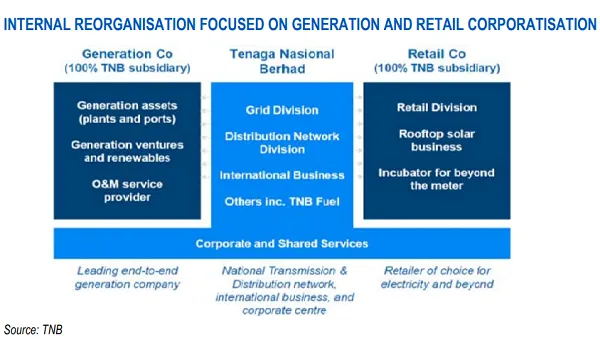
Malaysia's Tenaga Nasional Berhad to restructure amidst market liberalisation
Restructuring is expected to be completed by the third quarter of 2020.
Malaysian power utility Tenaga Nasional Berhad (TNB) has proposed an internal restructuring of its three divisions: generation company (Genco), TNB housing the regulated transmission & distribution as well as the international businesses, and retail company (Retailco). The exercise is expected to be completed by the third quarter of 2020, whilst the legal process of asset and liability transfer of each division is expected sometime in H1 2020.
According to UOB Kay Hian, this corporatisation is to prepare for sector liberalisation under MESI 2.0. “With independently appointed boards of directors and management teams, the separate divisions can focus on opportunities, efficiency and better financial performance,” said analyst Chong Lee Len.
The management has confirmed that TNB will remain under Incentive-based Regulation (IBR) into the foreseeable future. “Our channel checks confirm there will be no further corporate exercises ie separate listing of TNB post restructuring,” Chong said.
Also read: Malaysia's power companies revamp strategies for full market liberalisation
The key reason why retail will still remain under the IBR could be because the government continues to subsidise electricity prices for households and selected industrial players. Chong said, “As long as retailco buys bulk electricity from a single buyer ie TNB, the profit margin for retailco relies on: a) amount of bulk discount negotiated with TNB, and b) differentiated products, such as green energy. Cypark as a retailco can market its ‘source of energy’ as sustainable and green to suit eco-friendly MNCs like insurance, F&B or banking outfits.”
“The restructuring exercise clearly demarcates the key assets of regulated and non-regulated businesses. However, this does not change the earnings nor corporate profile of TNB. We see immediate risk in aggressive overseas expansion, not market liberalisation under MESI 2.0,” she commented.
Market liberalisation under MESI 2.0 — which is expected to be announced early Q4 — remains challenging, according to UOBKH as single buyer remains under TNB and creates a conflict of interest as the regulator attempts to build a wholesale market with transparent pricing structure. Chong also acknowledged the existence of long-term power purchase agreement (PPA) means little room for a power generator company to bid into a wholesale electricity market, and excess generation capacity of around 30% means the government is unlikely to provide significant plant up opportunities in the near term.
“Most generators are currently operating under a long term (with a balance of 5-20 years) PPA that promises long-term cashflow and little operational risk, and TNB has a 60% market share. Combined with a high reserve margin of at least 30%, we do not expect significant change to TNB’s Genco earnings and business profile in the next decade,” Chong said.













 Advertise
Advertise











